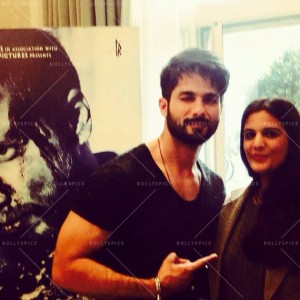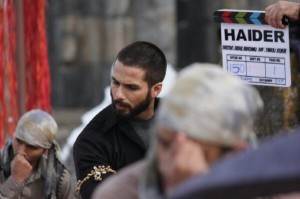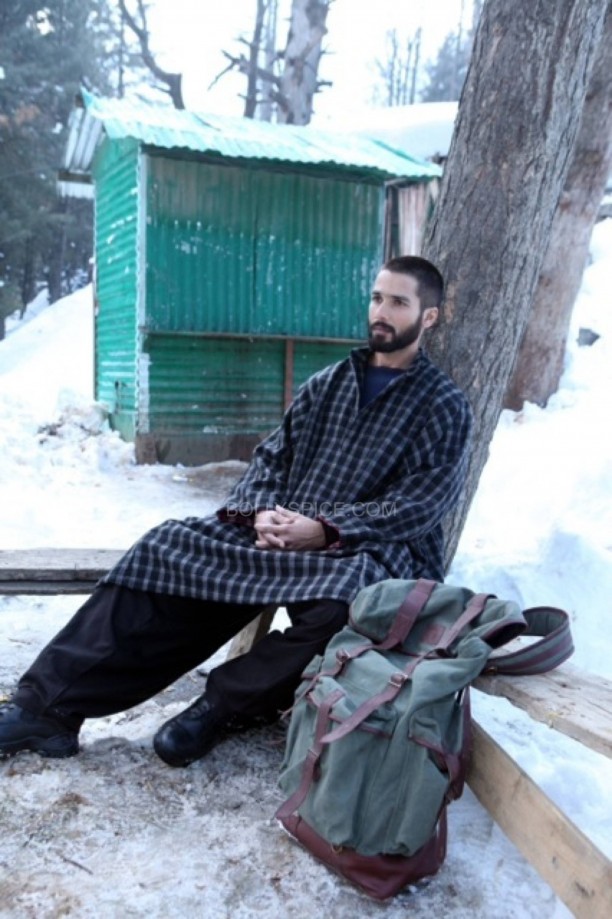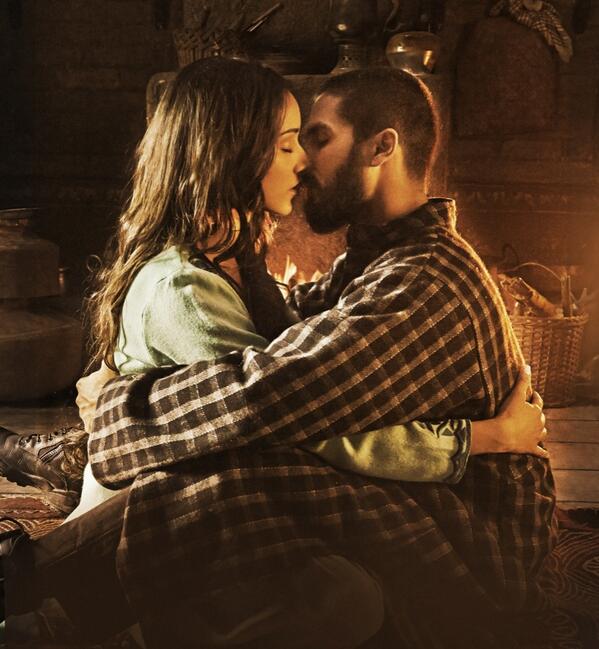 Shakespeare’s Hamlet has a complex protagonist, revenge, murder and deceit. It is no wonder that the play has witnessed a number of adaptations and is revered as one of Shakespeare’s greatest works. In terms of film, there have been several adaptations. However, Laurence Oliviers black and white adaptation produced in 1948 steals the show and remains as the only Shakespeare film to have won best picture and best actor at the Oscars.
Shakespeare’s Hamlet has a complex protagonist, revenge, murder and deceit. It is no wonder that the play has witnessed a number of adaptations and is revered as one of Shakespeare’s greatest works. In terms of film, there have been several adaptations. However, Laurence Oliviers black and white adaptation produced in 1948 steals the show and remains as the only Shakespeare film to have won best picture and best actor at the Oscars.
Now the time has come for Bollywood to explore Hamlet through Vishal Bhardwaj’s Haider, set for release on the 2nd of October 2014. The tragic prince is played by Shahid Kapoor, one of Bollywood’s most versatile actor’s. Shahid Kapoor received critical acclaim for his performance in Kaminey, also directed by Bhardwaj. Anticipation is running high not just for the Shakespearian Bollywood adaptation but for the director-actor duo to once again work their magic.
Vishal Bhardwaj and Shahid Kapoor recently visited London to share their insights on Haider through a press conference. Amongst the questions explored are: why Kashmir was chosen as the backdrop; what Hindi translation was chosen for the famous Shakespearian line “To be or not to be” and whether Shahid Kapoor feels Hamlet chose his destiny.
The press conference was hosted by television producer, director and author Nasreen Munni Kabir.
Nasreen Munni Kabir: Shahid- all the great skilled actors in the world want to play Hamlet. It’s a great challenge and Hamlet constitutes a complex character. How was it playing Hamlet?
Shahid Kapoor: Hamlet is a very coveted role for any actor. But I’ve been saying this, once you start playing the part it makes you feel extremely inadequate because it pushes you so much as an actor that you really wonder whether you have what it takes to pull off the role and satisfy the film makers requirement that Hamlet has.
 However, one has attempted it. I hope people like it. It gave me a lot of confidence every time Vishal sir would say he was happy with what I was doing because I honestly wasn’t sure – it’s a very complex role to play. Mentally the characters journey is very complex. Laurence Olivier said that it was the story of a man who could not make up his mind. But I do feel that this adaptation by Vishal sir is rather contemporary because the character is a lot more active as opposed to certain interpretations which are probably a little more passive, where it’s about someone who doesn’t do anything. Which I think is a lot more relevant to our youth today. The character is a young guy. It starts off with him being a student coming back to understand the dynamics that exist in his life at that time. It’s based in Kashmir which is beautiful yet tragic land- very relevant to our history. So yes- a very complex role to play. Possibly the most difficult of my career yet. But equally exciting and challenging.
However, one has attempted it. I hope people like it. It gave me a lot of confidence every time Vishal sir would say he was happy with what I was doing because I honestly wasn’t sure – it’s a very complex role to play. Mentally the characters journey is very complex. Laurence Olivier said that it was the story of a man who could not make up his mind. But I do feel that this adaptation by Vishal sir is rather contemporary because the character is a lot more active as opposed to certain interpretations which are probably a little more passive, where it’s about someone who doesn’t do anything. Which I think is a lot more relevant to our youth today. The character is a young guy. It starts off with him being a student coming back to understand the dynamics that exist in his life at that time. It’s based in Kashmir which is beautiful yet tragic land- very relevant to our history. So yes- a very complex role to play. Possibly the most difficult of my career yet. But equally exciting and challenging.
Kabir: I like what you said about the fact of the indecisiveness of the character. Here he seems to be much more taking things into his hands. Vishal can we ask you, when you adapted Shakespeare in terms of Haider, is the script a total re-write or do you retain certain aspects of the original? In Haider, what is it that does not translate if you want to make it into an Indian context?
Vishal Bhardwaj: You know Shakespeare has been my favourite because his dramas are just so juicy. The conflict is so universal that you can find those conflicts in any society- they are basic human conflicts.
I always try to remain true to the spirit of the play rather than the text words. This is what I did in Omkara also and I’ve taken those liberties in Maqbool also. In Haider also first comes spirit. I have taken structural liberties but all those milestones for which Hamlet is known are there. But of course, it’s a re-write for me and I see it as completely my own work. So you know it’s very difficult to take Shakespeare’s burden off your head. And especially when you are doing a trilogy.
Kabir: “To be or not to be” is one of the most famous lines from Shakespeare. How do you handle that in Hindi? What did you do with that?
Bhardwaj: I had many options. In Haider we have two or three places where he says different things. But basically for me: “Mein rahu ke mein nahin” or “hain ke hain nahin”?
 Kabir: Shahid can you tell me, in the beginning as you said it is the journey of this character of Haider. In the beginning you are in introvert, now that for an actor is complex to play as you have to make visible something that is internal –
Kabir: Shahid can you tell me, in the beginning as you said it is the journey of this character of Haider. In the beginning you are in introvert, now that for an actor is complex to play as you have to make visible something that is internal –
Shahid: Especially when you are given contact lenses to wear and you’re told you can only act with your eyes!
Yes but when you’re provided with such amazing content as an actor, when you’re provided with a situation- I mean, one is usually used to doing movies that are largely single layered. So to say. It’s very rare that you come across content as an actor, script as an actor, character as an actor, situations as an actor, which are complex. I guess that’s where performance can actually come from. I don’t think any actor can go beyond what the script is asking him to do. I can only do what the character demands, what the situation demands. So when you’re put in a situation which is rather complex it helps you perform better. So I don’t know about too many expressions or too little expressions- I don’t think of it like that. I just try to understand the character from his mental state and just try and be honest with how that character will be feeling in that situation and I’ve pretty much played the whole role like that. I’ve never tried to think of is this too many expressions- or is this loud or not loud? I think those things are largely governed by the director. If he feels that you’re doing something which is not in sur- in tune– as we say, with the rest of the film or situation, then he always comes and corrects me.
I think I have a fantastic relationship with Vishal sir on that and I think we had a really good relationship when we did Kaminey but now it’s grown a lot especially after this film. I felt very dependent on him pretty much through the film. I would be very unconfident if I couldn’t see what his expression was after I finished a shot. So yes I depended a lot on him. If he seemed happy I would feel like I’ve pretty much achieved what I was meant to do and I would feel good.
 Kabir: I must add that I don’t believe Vishal is someone who would compliment anyone easily. So if he says it’s okay, the takes okay!
Kabir: I must add that I don’t believe Vishal is someone who would compliment anyone easily. So if he says it’s okay, the takes okay!
Shahid: He is very encouraging on set. I’ve always felt that. You know a lot of people might feel that because of the content that you’ve viewed, you must be feeling that he’s really difficult or he pushes his actors – but actually he just provides you with a really good set of actors, with a really interesting new background and fresh content in terms of script. And all he does is encourages you on set. Actually he has never been angry or upset with an actor. I’ve never seen him do that which is an amazing, amazing quality.
Press: Now that the film is over and that you’ve portrayed your character, what is that one thing that has lingered on for you in real life?
Shahid: Well the hair grew back. The beard is lingering on (laughs). What has lingered on is the feeling – why didn’t I do more films like this after Kaminey? That’s the one feeling I felt the most. It was a very enriching experience as an actor. When you do films like this it reminds you of why you wanted to become an actor actually…I’m very clear that I want to do one such film every year for my journey as an actor. I hope I get those scripts and they come my way. It’s rare. I’ve been trying to convince Vishal Sir to make one film every year and cast me in it.
Press: Why did you choose Kashmir as the setting?
Bhardwaj: I had two options actually. Initially I had given the background of an espionage thriller to Hamlet-
Shahid: Which I had also said- Sir it’s a great plan! Then he told me, no it’s a rubbish plan!
Bhardwaj: I worked a lot with a friend of mine on the espionage background. But once it was completed, Gulzar Sir was the first person to actually point out: where is the tragedy in it? It feels like any American spy thriller, you’re just using Hamlet in it.
At that point I started to read Kashmiri writer Basharat Peer’s book called Curfewed Night, and I sincerely, I seriously think that Bollywood has not been very sensitive towards Kashmir – the biggest human tragedy of modern Indian history.
I have been reading about it a lot and thinking about it a lot that why we have not seen Kashmir from this side? Why do you always have to go from outside like an intelligence officer goes or an army officer goes. I was just- these thoughts were criss-crossing in my head and I happened to read Curfewed Nights. It’s a memoir of Basharat going through the conflict of ‘90’s from his early age till when he went to college in Aligarh. Lots of things in Shahid’s character I have taken from Basharat’s life. So I was open in my mind what this region has gone through in the conflict- and is going through. That’s why I thought Kashmir would be the best backdrop for my film.
 Press: Shahid, how did you prepare before each scene both emotionally and mentally?
Press: Shahid, how did you prepare before each scene both emotionally and mentally?
Shahid: First of all I’m very glad that we shot it where we shot it. Kashmir has a certain character to itself. And when we went to Kashmir, we pretty much shot it in two schedules of 25-30 days each. That really helped all the actors to disconnect from everything else and absorb the atmosphere that one was in and try and represent it correctly. So I think the fact that we were in Kashmir was fantastic.
One- we were surrounded by a really, really, really good cast. I had the fortune to work with the likes of Tabu mam, Irrfan Sir, KK Sir and pretty much everyone else on the film. That really helped me a lot. A lot of it usually comes from the script. So spending time on the script is most crucial. Talking with Vishal Sir and discussing various avenues of the script was very crucial.
And beyond that, it’s a rather personal, lonely journey when you play a role like this. Because you need to understand exactly all the things that are going on in this guy’s head because there is a lot going on in his life. So it’s instinctive and at some level you need to find your connection with the part that you’re playing and that’s how you become the part. That’s the attempt at least.
Press: Would you say that Hamlet chose his destiny?
Shahid: Hamlet is a thinking man’s hero. He’s not somebody who gets up and starts punching because there is a problem and he solves it. The way we are used to watching in a lot of movies- where the hero just gets up and breaks everybody’s face. He’s a complex character, he thinks a lot about life. He’s very human, very normal, very vulnerable. He’s sensitive. He doesn’t want to do anything that might be inappropriate. Because the film is a revenge family drama, he’s very affected by the relationships that he has- may it be with Ophelia, which is Shraddha’s character in the film or with Gerturde, his mother’s character played by Tabu or his uncle which KK has played.
Because all the conflict lies within the family, it is more difficult for him to do something radical or drastic but he is also a bit- he obviously has to be very passionate and extremely determined to eventually go through the journey he has to go through. Which is why I say he is not passive but active because he chooses to participate in his destiny.
So, I wouldn’t say he moulds his destiny. But he definitely doesn’t allow things to take its own course after a certain point in time. He is a reactive character and not a passive character for sure.








